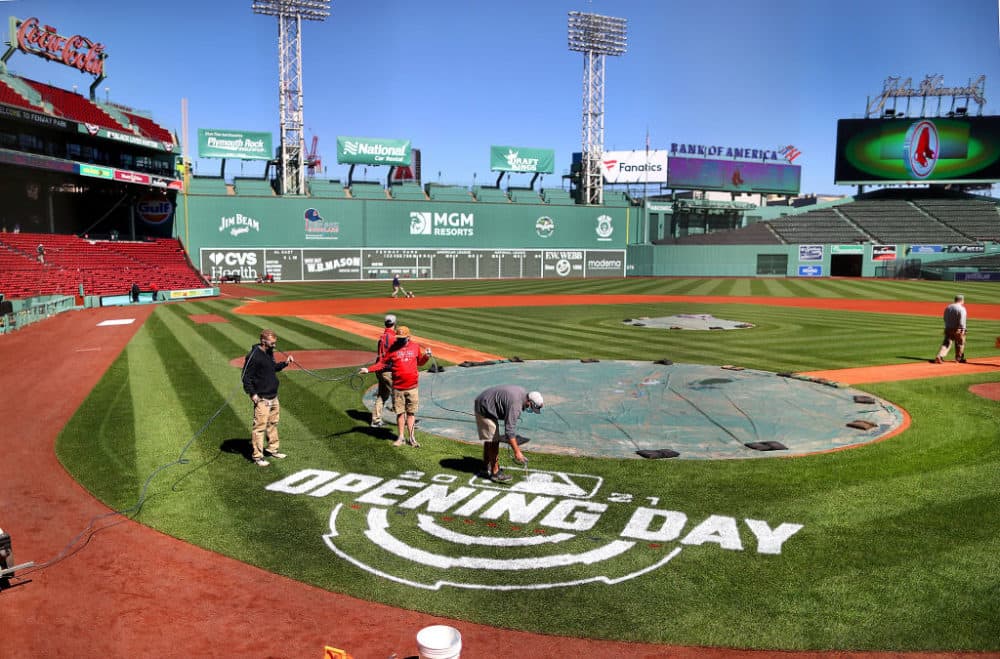Advertisement
Commentary
'The Inning Isn't Over': On Baseball And The Pandemic

The crack of baseball’s opening day is here, and if you’re like me, a member of that dwindling species of humans known as baseball fans, you’re giddy with irrational excitement. Today is an invitation to dream big. Past, shmast. Everyone — team, player and fan — can believe their fortunes will change: this will be their season.
I’m a Red Sox fan and a long-suffering Mets fan, thanks to my roots in New York suburbia. (These two affiliations alone are enough to raise your blood pressure.) But I’m also an ER doctor living and working in Rhode Island, a tiny state that’s had big COVID-19 problems.
I’d like to sink COVID-19 into the distant past, along with all remnants of last year’s odd, short, COVID-inflected season (the Sox record last year was 24-36 you might recall). But more than half-million Americans are dead and the pandemic has left an indelible trail of suffering on bodies, families, our mental well-being and social fabric. The future will be forever changed for far too many people.
I’m eager to embrace the hope earned from rising vaccinations. At the same time, my heart sinks with the news that infections and hospitalizations are on the rise again, as the U.S. enters a possible fourth wave.
The start of baseball season for me this year is more than a distraction, though, it’s an operating manual for getting through the seemingly never-ending pandemic.
[W]e’ve discovered the COVID-19 clock is happy to keep running as long as we, a society of players, prove unable or unwilling to make the simple plays.
Opening Day is an occasion. But once it’s over, the game counts just the same as the other 161 other games. The season is a grind. Nine innings a game, if they don’t drag into extra innings. A minimum of 1,458 innings between April and September, and the inning is a strange structure — defined by three outs each for the home and visiting team. When games drag on forever, part of the blame goes to the need for outs. And outs can be rare birds when the hitters are locked in, the pitchers are ineffective or the fielders are making errors. Unlike a sloppy display in football or basketball, the clock isn’t coming to rescue us in baseball.
The game eventually ends, but it depends on the skill and vigilance of individual players.
Last spring, I remember people — myself included — lamenting the possibility that we wouldn’t put COVID behind us until the summer. Over a year later, we’ve discovered the COVID-19 clock is happy to keep running as long as we, a society of players, prove unable or unwilling to make the simple plays.
That’s why we should look to baseball for guidance. It’s a team sport where individual play is under a microscope. There’s poetry to the game, acts of physical grace between moments of quiet strategy when it appears nothing is happening. There’s a game within the game. Watch ballplayers in person, and you’ll see fielders are on their toes with every pitch, ready if the ball comes their way. There’s tension in the four-tenths of second it takes for a batter to locate, recognize and decide whether to swing at a pitch or let it pass. During critical moments, the stress between pitches can push viewers on the edges of their seats or couches.
Baseball demands a lot from all of us. It challenges our need for distraction and forces us to face what we look to sports to forget: That failure and falling short are part of life. Our ability to keep our heads and learn from our mistakes is often what makes success — a perfect pitch, a well-timed hit, a bunt planted oh so perfectly — so emotionally rich and meaningful.
Opening Day reminds us that baseball is that rare game where the defense controls the ball. It’s one of the reasons why a team can’t have enough good pitching. Yes, COVID-19 is a powerful foe, and too many people have suffered mightily and needlessly. And yet, there’s so much that’s still under our control — following social-distancing guidelines, gathering judiciously, wearing facial coverings, getting immunized when it’s our turn.
Baseball also shows us that data is often an incomplete measure of our efforts. A hitter can barrel the ball and still go 0-4. At the same time, a perfectly placed pop fly can drop in for a double. The game can be cruel and unfair when doling out fates, but over a long season, and an increasing number of chances, an accurate and undeniable picture of a player and a team’s ability emerges.
I understand the societal urge to just run off the field and put this all behind us. But the inning isn’t over. Not yet anyway.
This was on my mind as I listened to the U.S. Centers for Disease Control and Prevention Director Dr. Rochelle Walensky deliver an urgent plea to “hold on a little longer,” and her “impending sense of doom,” if we take our eye off the ball too soon. Variants of the virus are in our communities. Our recent seven-day average — slightly less than 60,000 cases — is 10% higher than the previous week. The number of hospitalizations and deaths are clicking upward as well.
I understand the social and economic drivers pushing certain states to relax COVID restrictions, but I can’t forget that each pandemic surge this past year was followed by calm, a pause. People lowered their guard, returned to their regular lives when possible, only to be swallowed by a more significant, more worrisome wave.
The statistics on vaccinations are encouraging, but we won’t be perfect. We have to possess the collective fortitude to grind it out a little longer and do the right thing.
The best ballplayers use their failures and learn from them. The pandemic challenged and changed me, just as it likely challenged and changed you. I understand the societal urge to just run off the field and put this all behind us. But the inning isn’t over. Not yet anyway.
